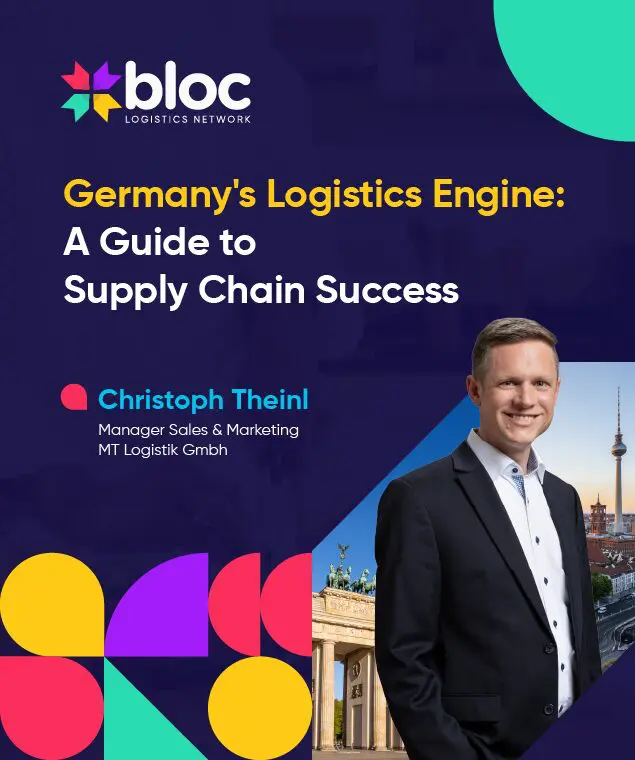By Wayne Amber, Account Director at Reef Logistics Ltd
In the ever-shifting landscape of global trade, the United Kingdom’s logistics sector has been at the forefront of adaptation and innovation. Following Brexit and the recalibration of global supply chains, the UK has rolled out a strategic initiative designed to turbocharge its trade, manufacturing, and investment potential: the Freeport model. Among these, the Thames Freeport stands out as a colossal force, poised to redefine the flow of goods into and out of the country.

But what does this mean on a practical level for shippers, importers, and fellow freight forwarders? How can businesses leverage this opportunity to gain a competitive edge? To demystify this powerful economic zone, we turn to a local expert whose business operates at its very heart.
“The Thames Freeport isn’t just a new set of rules; it’s a fundamental shift in how we approach UK-centric logistics,” explains Wayne Amber, Managing Director of Reef Logistics Ltd, a premier freight forwarding company based in Essex. “For those of us on the ground here, we’re seeing the blueprint for a smarter, faster, and more economically efficient supply chain being laid out right on our doorstep. It’s a game-changer, but one that requires deep local knowledge to unlock fully.”
With insights from Wayne, this article will explore the immense potential of the Thames Freeport, breaking down its benefits, navigating its complexities, and highlighting why Essex is now more than ever a critical hub for global trade.
What Exactly is the Thames Freeport?
A Freeport is a designated area within a country’s borders where different customs rules apply. Think of it as a secure economic zone where goods can be imported, manufactured, and re-exported without incurring the usual import tariffs and taxes. The primary goal is to stimulate economic activity by making it easier and cheaper to do business.
The Thames Freeport is one of the largest and most strategically significant of the UK’s new Freeports. It’s a private-sector-led initiative built around a formidable cluster of assets:
- The Port of Tilbury: A historic and versatile port handling a vast range of cargo, from containers to bulk goods.
- London Gateway: The UK’s most advanced, automated deep-sea container port and logistics park.
- Ford Dagenham: A revitalised site focusing on advanced automotive manufacturing and logistics.
This trifecta of sites, connected by the River Thames and located in the heart of Essex, creates a powerful ecosystem for trade. “The synergy between these three locations is what gives the Thames Freeport its unique advantage,” notes Wayne. “You have the world-class container handling of London Gateway, the diverse capabilities of Tilbury, and the manufacturing powerhouse of Ford. For a logistics partner like us, it means we can offer clients a seamless, integrated solution for nearly any type of cargo, all within a single, tax-efficient zone.”
The Freeport’s vision extends beyond just moving boxes. It aims to become a global hub for innovation, particularly in green technology, automation, and next-generation logistics, backed by significant government support and private investment.
The Core Benefits for Shippers and Forwarders
For businesses involved in international trade, the practical advantages offered by the Thames Freeport are substantial. These benefits can be broadly categorised into customs, tax, and operational efficiencies. Wayne Amber breaks down what this means for his clients at Reef Logistics.
1. Customs and Duty Suspension
This is the cornerstone of the Freeport model. When goods arrive at the Thames Freeport from overseas, they are essentially held in a customs ‘suspense’ zone.
- Duty Deferral: Import VAT and customs duties are not paid until the goods leave the Freeport and enter the UK domestic market. “This is a massive cash flow advantage for our clients,” Wayne states. “Instead of paying duties immediately upon arrival, a business can store its goods, process them, or await the optimal market conditions before distributing them into the UK. The capital that would have been tied up in taxes can be used for growth and operations.”
- Duty Inversion: If raw materials are imported into the Freeport to be manufactured into a finished product, businesses may benefit from ‘duty inversion’. This means that when the final product leaves the Freeport for the UK market, the owner pays the duty rate applicable to the finished product, which can often be lower than the tariffs on the individual imported components.
- Duty Exemption: If goods are imported into the Freeport, processed or assembled, and then re-exported to another country, no UK customs duties are payable at all. “This transforms Essex into an ideal hub for European and global distribution,” Wayne emphasizes. “A company in Asia can ship goods to our facility within the Freeport, we can handle storage, final assembly, or even just relabelling, and then dispatch them to markets in the EU or the Americas without ever navigating the complexities of UK import tariffs.”
2. Generous Tax Incentives
To encourage investment and job creation, the government has introduced a suite of tax reliefs for businesses operating within designated Freeport tax sites:
- Enhanced Capital Allowances: Businesses can claim 100% tax relief on investments in new plants and machinery in the first year.
- Stamp Duty Land Tax (SDLT) Relief: Companies purchasing land or property within the Freeport for commercial use can receive full relief from SDLT.
- Business Rates Relief: Eligible businesses can receive up to 100% relief from business rates for five years.
“These tax incentives are not just for the giant multinational corporations,” Wayne clarifies. “They are designed to encourage businesses of all sizes to set up shop here. For a logistics provider, it means we can invest more heavily in state-of-the-art warehousing, automation, and green vehicle fleets, which directly benefits our clients through better service and efficiency.”
3. Simplified Planning and Operations
The Freeport designation comes with a streamlined planning process, making it faster and easier to secure permission for new construction and development. This accelerates the building of new warehouses, distribution centres, and manufacturing facilities, ensuring that infrastructure keeps pace with demand. For freight forwarders, this means more capacity, more options, and less congestion.
Navigating the Challenges: An Expert’s Perspective
While the opportunities are immense, the Thames Freeport is not a simple ‘plug-and-play’ solution. Maximising its benefits requires navigating a new layer of regulations and procedures. This is where the value of an experienced, locally-based logistics partner becomes indispensable.
“It’s not a magic wand that eliminates all paperwork,” Wayne cautions with a dose of realism. “To access the benefits, you need to be an authorised operator and adhere to strict customs control, inventory management, and reporting requirements. The procedures are different from standard importation. Without the right expertise, a business can easily miss out on the savings or, worse, fall foul of compliance.”
The key challenge is integration. How does a shipment moving through the Freeport interact with the rest of a company’s national or international supply chain? How are goods tracked, declared, and released?
“Our role at Reef Logistics is to be that expert guide,” he continues. “We’ve invested heavily in understanding the specific systems and legal frameworks of the Freeport. We handle the authorisations, manage the declarations, and ensure our clients’ goods flow seamlessly from port to Freeport warehouse to final destination, all while maximising every available duty and tax benefit. We take on the complexity so our clients can focus on the commercial opportunity.”
However, these challenges are also driving significant opportunities for investment and improvement. The Romanian government, along with private terminal operators, is accelerating investment in critical infrastructure projects. These include:
∙ Port Expansion: Developing new terminals, expanding existing container yards, and dredging to accommodate even larger vessels.
∙ Rail Modernization: Upgrading key railway lines connecting the port to the Hungarian border to increase speed and capacity.
∙ Digitalization: Implementing smart port solutions, digital customs platforms, and tracking systems to improve efficiency and transparency.
For businesses looking to capitalize on Romania’s potential, navigating this environment requires deep local knowledge. This is where a skilled freight forwarder becomes an indispensable partner.
“Our value lies in our ability to anticipate and mitigate these challenges for our clients,” Roxana emphasizes. “We have long-standing relationships with port authorities, customs officials, and transport providers. We know which rail routes are congested and when to pivot to a barge or truck solution. We can advise on the correct documentation to ensure smooth customs clearance. A shipper in Shanghai or Dubai doesn’t see the operational complexities on the ground; they just need their cargo to arrive on time. Our job is to manage that complexity so they can focus on their business. A proactive local partner is not a luxury here; it’s a necessity.”
Essex: The Epicentre of the UK’s New Logistics Era
The establishment of the Thames Freeport cements Essex’s position as the UK’s most critical logistics gateway. Its strategic location offers unparalleled access to London, the affluent Southeast of England, and direct, uncongested sea routes to global markets.
The region already boasts a mature logistics infrastructure, a skilled workforce, and excellent road and rail connectivity. The Freeport acts as a powerful catalyst, amplifying these existing strengths.
“Being based in Essex is a strategic imperative now,” Wayne asserts. “We’re not just near the action; we are part of the ecosystem. We have daily working relationships with the port operators, customs officials, and other service providers within the Freeport. This proximity gives us an agility and a level of real-time problem-solving that a forwarder based elsewhere simply cannot replicate. When a client has an urgent shipment, we can physically be at the port in minutes.”
This local presence is crucial for navigating the nuances of the Freeport’s operations and for building the trusted relationships that keep supply chains resilient.
The Future is Here: Partnering for Success
The Thames Freeport represents a bold vision for the future of UK trade. It offers a powerful combination of financial incentives, customs simplification, and strategic location that businesses cannot afford to ignore. However, realising this potential requires more than just shipping goods to a specific postcode; it requires a strategic partnership with a logistics expert who possesses the local knowledge, technical expertise, and forward-thinking mindset to make it work.
“The conversation we’re having with our clients has changed,” Wayne concludes. “It’s no longer just about rates and transit times. It’s about supply chain strategy. We’re advising them on how to restructure their European distribution models, how to leverage duty suspension for better cash flow, and how to future-proof their operations by investing in this region. We are not just a vendor; we are a growth partner.”
For any business looking to import, export, or distribute through the UK, the Thames Freeport is an unmissable opportunity. By partnering with a dedicated expert like Wayne Amber and Reef Logistics Ltd through the Bloc Logistics Network, you can ensure you’re not just witnessing this new era of trade, you’re leading it.
The region already boasts a mature logistics infrastructure, a skilled workforce, and excellent road and rail connectivity. The Freeport acts as a powerful catalyst, amplifying these existing strengths.
“Being based in Essex is a strategic imperative now,” Wayne asserts. “We’re not just near the action; we are part of the ecosystem. We have daily working relationships with the port operators, customs officials, and other service providers within the Freeport. This proximity gives us an agility and a level of real-time problem-solving that a forwarder based elsewhere simply cannot replicate. When a client has an urgent shipment, we can physically be at the port in minutes.”
This local presence is crucial for navigating the nuances of the Freeport’s operations and for building the trusted relationships that keep supply chains resilient.

Article by Wayne Amber
Accounts Director,
Reef Logistics Ltd, a member of Bloc Logistics Network
Reef Logistics Ltd Reef Logistics Ltd delivers reliability and precision in every shipment. Based in Essex, UK, they specialise in the transport of fresh produce and refrigerated containers, maintaining quality and freshness from origin to destination. Beyond perishables, Reef Logistics provides full-service freight solutions for all cargo types (FAK), including dry goods and machinery, supported by expert customs clearance to ensure smooth import and export operations. Known for efficiency, flexibility, and attention to detail, they are your trusted partner for seamless freight forwarding across the UK and beyond..
Bloc Logistics Network is a global platform that connects logistics professionals to share opportunities and collaborate without barriers. Bloc aims to level the playing field by creating an accessible, supportive environment where professionalism and collaboration drive real results. It serves as an ecosystem designed for mutual advancement, ensuring growth, efficiency, and success across the logistics industry.





